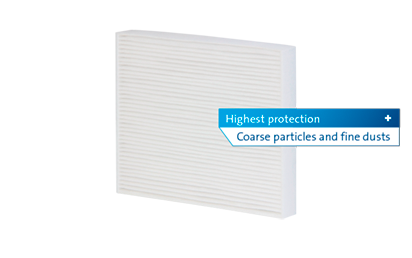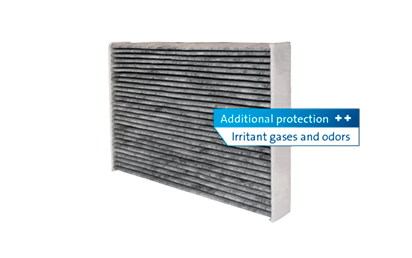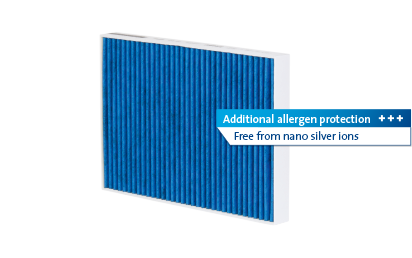micronAir cabin air filters
Number 1 in the world for OEM supply
Pollen, soot, fine dust, allergens and gases are considerable risk factors for personal health and safety in road transportation. They can significantly impact the functioning of heating and air-conditioning systems. With our high-quality micronAir cabin air filter solutions, we offer reliable and long-lasting protection for vehicle occupants as well as system processes.
Learn how the different models of micronAir premium cabin air filters protect against external influences.
micronAir proTect line: Four filter layers, highest air quality
Fourfold defense against polluted air
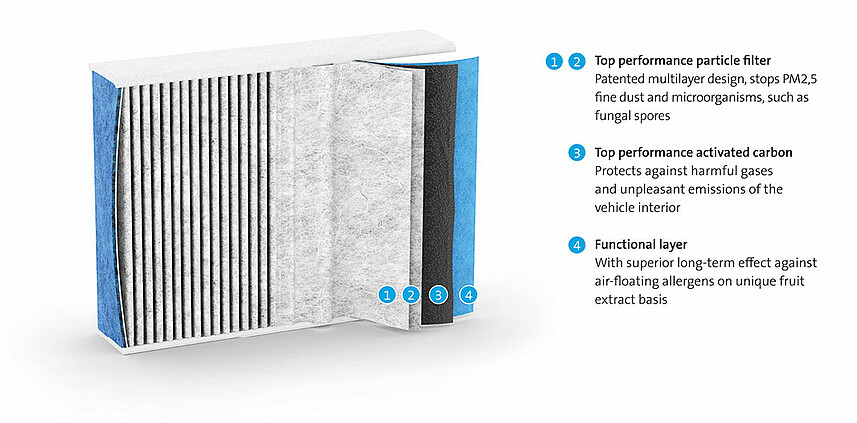
Experience how micronAir cabin air filters protect against pollutants.
Evolution of the Freudenberg cabin air filter
With the invention of the first cabin air filter in 1989, Freudenberg Filtration Technologies set new standards in health protection and safety within vehicles. To this day, our customers value us as a dependable innovation partner in the development of first-class cabin air filters for the automotive industry. With our years of expertise, we have the ideal foundation for producing filter media of the highest quality.
Develop your new cabin air filter with us today.
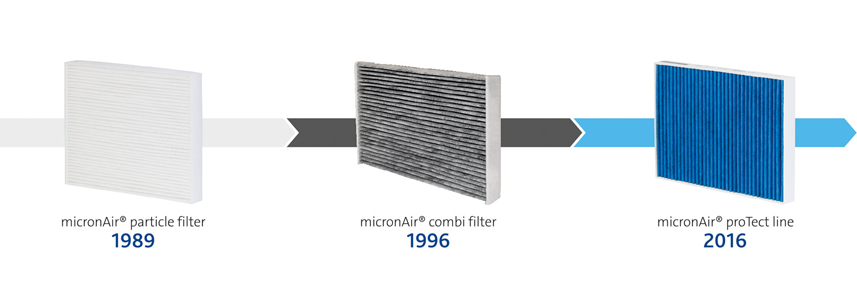
Strong super heroes for all of us
Versatile and reliable companions
micronAir cabin air filters are versatile and reliable companions during every car trip. Learn here how our useful helpers make every trip safer and more comfortable.
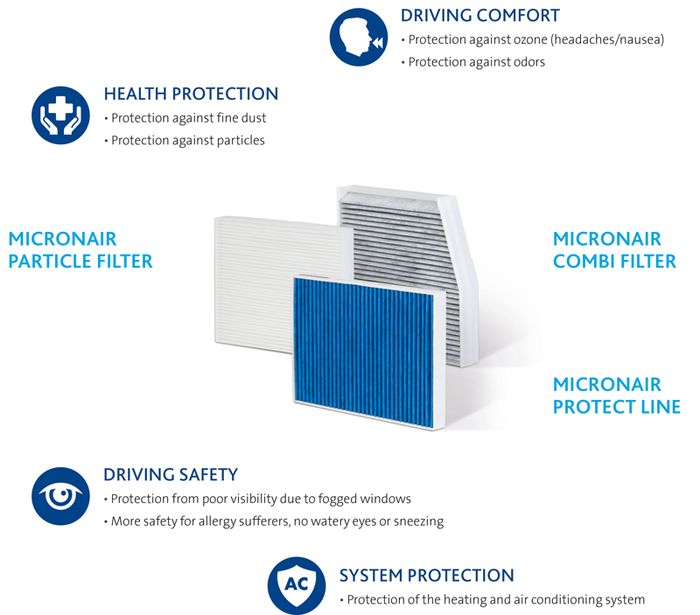
-
Your health is important to us
In vehicles without a cabin air filter, unfiltered pollutants can reach levels six times higher than at the roadside. In addition to allergic reactions, they can also cause respiratory tract illnesses, cardiovascular problems and asthma. micronAir cabin air filters effectively protect vehicle occupants from fine dust, pollen, gases, road dust and other ultra-fine particles that can enter the lungs. They minimize the health risks in the vehicle and ensure greater comfort during travel.
Protection from particles and fine dust
One cubic meter of breathing air can contain between 10 and 80 billion particles – depending on the weather and local conditions. When these particles are inhaled, exactly where they are deposited depends on their size. Basically, one differentiates between two particle sizes: larger than 2 micrometers (µm = one thousandth of a mm) and smaller than 2 micrometers.
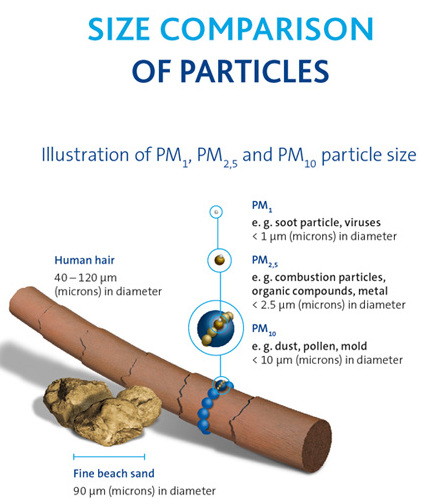
Small particles
Particles larger than about 2 µm are primarily filtered out by the upper respiratory passages. They can cause allergic reactions and impair comfort. Particularly people with allergies suffer from these small particles. Watery eyes, running nose, difficulty breathing or sneeze attacks reduce concentration and increase the risk of an accident. Sneezing at a speed of 80 kph results in 25 meters of blind driving!
Fine dust
Particles smaller than about 2 µm are found most commonly in the air. The mucous membranes of the nose and throat or nasal hairs are able to capture only some of this fine dust. Particles of this size are primarily deposited in the lower respiratory tracts or the lungs. These respirable particles include pollutants such as bacteria and fungal spores, industrial dust, fine abraded particles and soot or diesel soot. This is particularly harmful to health as it can trigger inflammations in the lungs and transport toxic substances. Diesel soot is a cause of respiratory diseases, cardiovascular diseases, and asthma. It is also believed to have a carcinogenic effect. micronAir filters offer special protection especially against these fine dusts.
-
Greater driving comfort
A survey has confirmed that drivers want to be effectively protected against odors and pollutants as well as respirable dust. The micronAir combi filters offer additional protection against gases and odors thanks to their activated carbon layer.

Ozone protection
In enclosed spaces, and especially inside the vehicle, passengers are exposed not only to solid particles but also gases that are ten million times smaller. These often very harmful gases, such as benzene, toluene or ozone, enter into the deep regions of the lungs when inhaled. Ozone is a harmful irritant gas. It causes health problems, such as headaches, tickling of the throat, watery eyes and dizziness. The activated carbon layer of the micronAir combi filter removes up to 99 percent of the ozone to ensure comfortable travel.
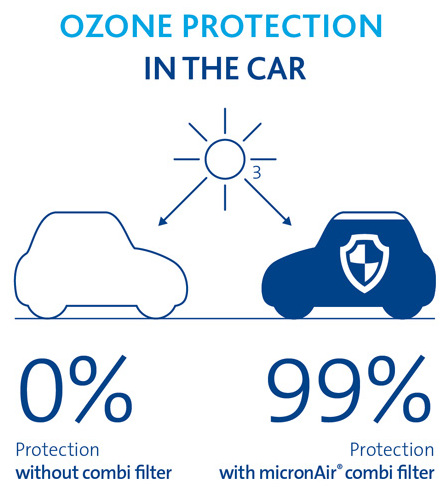
Odor protection
While driving, we are confronted with a variety of odors: industrial and vehicle exhaust gases, freshly fertilized fields or sewage plants. Everyone perceives these odors differently. What smells merely unpleasant to one person is quite annoying to another. To prevent odors from even entering the vehicle in the first place, the micronAir combi filters have an additional activated carbon layer. This ensures an odor-free interior and greater comfort, especially on long trips.
-
For more driving safety

Particulate matter in the car will cause the windows to fog up more quickly. Pollen, road dust and other particles accumulate on the inside of the windows, attract moisture and significantly impair visibility. micronAir cabin air filters clean the air of particles and fine dust to ensure clean windows and a clear view. If the windows do start to fog up, it is time for a filter change.
Fresh air
The air-conditioner frequently runs in circulation mode due to odors or to protect against poor outside air. The vehicle passengers consume the oxygen, causing the CO2 concentration in the car to steadily rise. Possible consequences are fatigue, inattention and headache. micronAir cabin air filters ensure fresh and particle-free air in the vehicle, thus promoting good concentration.
Pollen protection
Especially during pollen season, micronAir cabin air filters protect allergy and asthma sufferers from sneeze attacks and watery eyes. Such allergic reactions quickly lead to an increased risk of accidents: A sneeze attack at 80 kph results in 25 meters of blind driving.
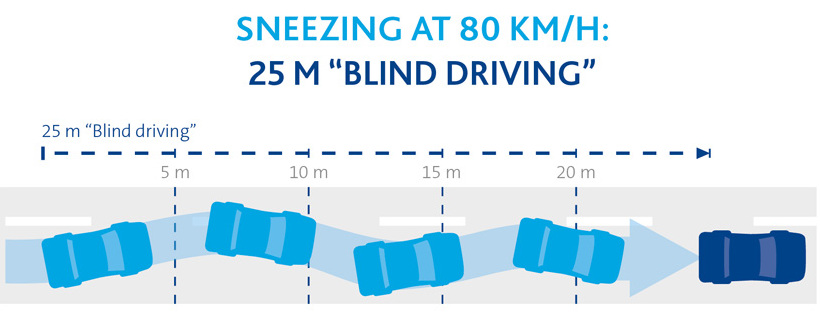
-
Longer lifespan for air-conditioners
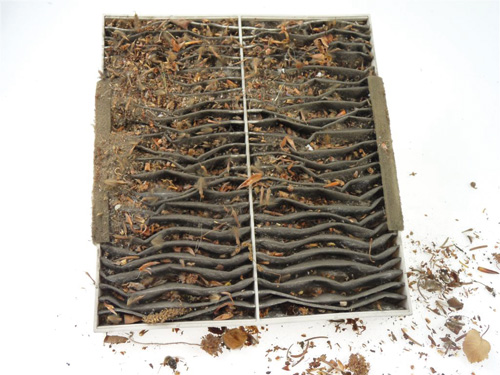
Over time, air contaminants lead to decreased performance of the heating and air-conditioning system. The service life of the downstream components is reduced. For this reason, nearly all car makers install appropriate cabin air filters in the heating and air-conditioning system. These prevent the entry of dust particles and protect the system.
Regular filter changes for greater protection
Particles can also enter the heating and air-conditioning system due to dirty cabin air filters that are not changed in a timely fashion. This not only results in worse air quality in the vehicle, it also impairs the performance of the systems. Possible consequences include increased fuel consumption or even a complete failure of the air-conditioning system. Cabin air filters should therefore be changed at regular intervals in order to avoid additional costs.
Would you like to learn more about cabin air filters?
Find answers to the most frequently asked questions here









